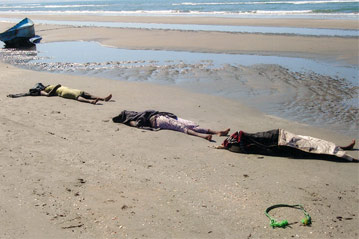Drownings off Yemen coast could be first of many, warns UNHCR
Drownings off Yemen coast could be first of many, warns UNHCR
GENEVA, September 6 (UNHCR) - The UN refugee agency has expressed serious concern over the death of at least 75 Somalis and Ethiopians while crossing the Gulf of Aden aboard smugglers' boats in an attempt to reach Yemen from Somalia.
UNHCR staff in Yemen reported that these people had been aboard four motorised canoes carrying 369 Africans that had travelled from Bossasso in north-eastern Somalia on September 1 and 2. Survivors said that off the Yemeni coast, they were told to jump into the sea and swim to shore.
Seventy-five bodies have so far been recovered along the Yemeni coast. Some 50 survivors made it to shore and were taken to UNHCR's reception centre in Mayfaah, where they have received shelter and food. The remaining passengers have not been found, but many may have arrived at different parts of the Yemeni coast and decided not to seek the agency's help.
The Somalis in the group, recognised by UNHCR as refugees on a prima facie basis, will be further transported by the agency's partner on the ground, SHS, on a 10-hour trip to Al Kharaz camp near Aden. The camp currently houses some 7,500 Somalis.
"This is the latest of many such tragic incidents, many of them unreported, off the coast of Yemen," UNHCR spokesman Ron Redmond told reporters in Geneva on Tuesday. "People are drowning not because they have been denied access to protection or to the territory of Yemen, or because they fear interception at sea, but because they are desperate and at the mercy of ruthless smugglers. Nor is there any authority in Bossasso trying to dissuade them from making the perilous journey in the first place."
On March 3 this year, some 90 people, including women and children, died when a vessel carrying 93 passengers - one of six that had sailed from Bossasso - sank in the Gulf of Aden after developing a technical problem. Only the crew reportedly survived. Some of the Somalis had been severely beaten by the smugglers. A few days later, on March 7, another 85 people were ordered to jump overboard while still far from the coast. Eighteen drowned.
People arriving in Yemen tell harrowing stories of journeys lasting 48 hours in small motorised canoes on rough, shark-infested seas. Beatings take place en route, sometimes simply because people move an inch and destabilise the already instable boats. Some passengers decide to jump overboard into the high seas to escape the violence inside the boat. Others arrive with severe burns on their body from having been pushed too close to the engines.
Passengers who are forced or choose to jump overboard close to the coast of Yemen are sometimes rescued or picked up dead by the Yemeni security guards. UNHCR and SHS have built six shelters, latrines, water reservations and kitchens near Keida on the coast, where many arrive initially.
Once the two agencies are informed about the new arrivals, they provide some initial care, including basic medical assistance. Arrivals who have prima facie status are then transferred to the UNHCR reception centre in Mayfaah, three hours to the north. UNHCR and SHS at several times have also helped to bury the dead on the coast line.
"This latest incident marks the start of calmer weather in the Gulf of Aden, and we fear we could see more tragedies in the coming months," said Redmond. "Most of the migrants normally start coming to Yemen between mid-September and March, when the sea is at its calmest."
The first group of people reportedly already arrived on August 17. Since then, seven boats have been recorded approaching the Yemeni coast. Over 100 people on these boats drowned, according to survivors.
Yemen, one of the few countries in the region to have signed the 1951 Convention relating to the Status of Refugees, has been extremely generous in receiving migrants and refugees. There are currently some 47,000 Somalis registered with UNHCR as refugees on a prima facie basis in Yemen, but it is estimated that there are hundreds of thousands more in the country.
An estimated 95 percent of the new Ethiopian and Somali arrivals - which average 100 a day during September and March, according to some sources - ultimately continue north in search of better economic possibilities elsewhere in the region.








